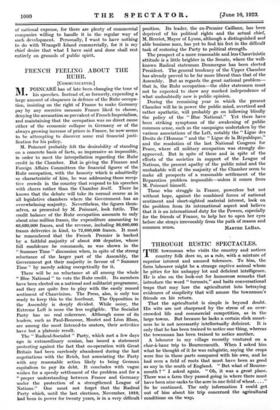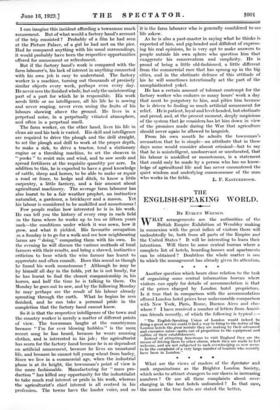THROUGH RUSTIC SPECTACLES. T HE townsman who visits the country and
notices country folk does so, as a rule, with a mixture of superior interest and amused tolerance. To him, the farm labourer might be a strange captive animal whom he pities for his unhappy lot and deficient intelligence.
He is also on the look-out for humorous remarks that introduce the word " turmuts," and baits conversational traps that may lure the agriculturist into betraying evidences of simplicity that will amuse the townsman's friends on his return.
That the agriculturist is simple is beyond doubt. His wits are not sharpened by the stress of an over- crowded life and commercial competition, as in the large towns. But because he lacks a certain slick smart- ness he is not necessarily intellectually deficient. It is only that he has been trained to notice one thing, whereas the townsman has been trained to notice another.
A labourer in my village recently ventured on a char-a-bane trip to Bournemouth. When I asked him what he thought of it he was eulogistic, saying the crops were fine in those parts compared with his own, and he had seen a field of roots that must have been as good as any in the south of England. " But what of Bourne- mouth ? " I asked again. " Oh, it was a great place. There was a farm they passed going in where there must have been nine sacks to the acre in one field of wheat. .. ." So he continued. The only information I could get out of him about his trip concerned the agricultural conditions on the way. I can imagine this incident affording a townsman much amusement. But of what would a factory hand's account of the trip consisted ? Probably of a film he had seen at the Picture Palace, of a girl he had met on the pier. Had he compared anything with his usual surroundings, it would probably have been the respective opportunities offered for amusement or refreshment.
But if the factory hand's work is compared with the farm labourer's, his lack of interest in anything connected with his own job is easy to understand. The factory worker is a machine, turning out thousands of precisely similar objects every week, perhaps even every day. He never sees the finished whole, but only the uninteresting part of a part for which he is responsible. His work needs little or no intelligence, all his life he is sowing and never reaping, never even seeing the fruits of his labours showing above the ground. He lives in a perpetual noise, in a perpetually vitiated atmosphere, and often in a perpetual smell.
The farm worker, on the other hand, lives his life in clean air and his task is varied. His skill and intelligence are required to drive the plough and the drill straight, to set the plough and drill to work at the proper depth, to make a rick, to drive a tractor, tend a stationary engine or a threshing machine, to set the sheaves in " pooks " to resist rain and wind, and to sow seeds and spread fertilizers at the requisite quantity per acre. In addition to this, he is expected to have a good knowledge of cattle, sheep and horses, to be able to make or repair a road or fence, to hedge and ditch, to know a little carpentry, a little farriery, and a fair amount about agricultural machinery. The average farm labourer has also learnt to be a fair weather prophet, an instinctive naturalist, a gardener, a bricklayer and a mason. Yet his labour is considered to be unskilled and monotonous Few people realize how interested he is in his work. He can tell you the history of every crop in each field on the farm where he works up to ten or fifteen years back—the conditions under which it was sown, how it grew, and what it yielded. His favourite occupation an a Sunday is to go for a walk and see how neighbouring farms are " doing," comparing them with his own. In the evening he will discuss the various methods of local farmers with their results, and bring a shrewd, instinctive criticism to bear which the wise farmer has learnt to appreciate and often consult. Does this sound as though he found his work monotonous ? Although he may be by himself all day in the fields, yet he is not lonely, for he has learnt to find the closest companionship in. his horses, and half the time he is talking to them. On Monday he goes out to sow, and by the following Monday he may perhaps see the result 'of his labour already sprouting through the earth. What he begina he sees finished, and he can take a personal pride in the completion that the factory hand cannot know.
So it is that the respective intelligence of the town and the country worker is merely a matter of different points of view. The townsman laughs- at the countryman because " I'm for ever blowing bubbles " is the most recent song he has heard, because he wears amusing clothes, and is interested in his job ; the agriculturist has scorn for the factory hand because he so dependent on artificial amusement, because he lives an unnatural life, and because he cannot tell young wheat from barley. Since we live in a - commercial age, when the industrial phase is at its height, the townsman's point of view is the more fashionable. Manufacturing for " mass pro- duction " has killed any opportunity for the industrialist to take much real interest or pride in his work, whereas the agriculturist's chief interest is all centred in his profession. The towns have the louder voice, and so it is the farm labourer who is generally considered to-see life askew.
As he is also a past-master in saying what he thinks is expected of him, and pig-headed and diffident of express- ing his real opinions, he is very apt to make answers to people outside his own sphere who question him that exaggerate his conservatism and simplicity. He is proud of being a little old-fashioned, a little different from the commercial race that has sprung up in the big cities, and in the obstinate defence of this attitude of his he will sometimes intentionally act the part of the unsophisticated yokel.
He has a certain amount of tolerant contempt for the factory worker who endures so many hours' work a day that must be purgatory to him, and pities him because he is driven to finding so much artificial amusement for relief. He is patient, loyal and level-headed, but obstinate and proud, and, at the present moment, deeply suspicious of the system that he consider$ has let him down in view of the promises made during the War that agriculture should never again be allowed to languish.
From his own mouth he admits the townsman's accusation that he is simple—an attribute that in these days some would consider almost criminal—but to say that he is unintelligent, unobservant or uneducated, that his labour is unskilled or monotonous, is a statement that could only be made by a person who has no know- ledge of agricultural life and has never encountered the quiet wisdom and underlying commonsense of the man who works in the fields. L. F. EASTERBROOK.







































 Previous page
Previous page